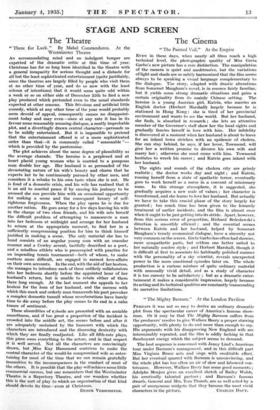The Cinema
" The Painted Veil." At the Empire EvEN in these days, when nearly all films reach a high technical level, the photographic quality of Miss Greta Garbo's new picture has a rare distinction. The manipulation of the camera is quiet and unobtrusive, but the variations of light and shade are so subtly harmonized that the film seems always to be speaking a visual language complementary to the dialogue. The story, adapted with drastic alterations from Somerset Maugham's novel, is in essence fairly familiar,- but it yields some strong dramatic situations and gains a certain originality from its mainly Chinese setting. The heroine is a young Austrian girl, Katrin, who marries an English' doctor (Herbert Marshall) largely because he is stationed in Hong Kong ; she is tired of her provincial environment and wants to see the world. But her husband, she finds, is absorbed in research ; she lets an attentive member of the Governor's staff show her the local sights and gradually fancies herself in love with him. Her infidelity is discovered at a moment when her husband is about to leave for an inland town stricken with an epidemic of cholera. She can stay behind, he says, if her lover, Townsend, will give her a written promise to divorce his own wife and marry her ; otherwise she must come with him. Townsend hesitates to wreck his career ; and Katrin goes inland with her husband.
The sights and sounds of the cholera city are grimly realistic ; the doctor works day and night ; and Katrin; rousing herself from a state of apathetic terror, eventually goes to work herself as a nurse in a convent of missionary nuns. In this strange atmosphere, it is suggested, she gradually acquires a new scale of values ; her character is transformed, and she learns to love her husband. But actually we have to take this crucial phase of the story largely for granted ; too much time has been given to the leisurely treatment of earlier incidents, and the film is almost over when it ought to be just getting into its stride. Apart, however, from this serious error of proportion, Richard Boleslawski's direction is smoothly efficient ; and the essential scenes between Katrin and her husband, helped by Somerset Maugham's tersely economical dialogue, have a sincerity not very common on the screen. Greta Garbo has often had showier. more sympathetic parts, but seldom one better suited to her naturally sombre style ; and Herbert Marshall, though it is difficult at first to associate his habitually polished manner with the personality of a shy scientist, reveals unexpected power in the more emotional episodes later on. The whole production is a curious mixture of quite ordinary material with unusually vivid detail, and as a study of character it is too cursory to be satisfactory ; but as a dramatic enter- tainment it makes a considerable impression, largely because its acting and its technical qualities are constantly transcending its narrative limitations.
• " The Mighty Barnum." At the London Pavilion PERHAPS it was not so easy to derive an ordinary dramatic plot from the spectacular career of America's famous show- man. Or it may be that The Mighty Barnum suffers from the producers' resolve to give Wallace Beery a proper starring opportunity, with plenty to do and more than enough to say. His arguments with his disapproving New England wife are interminably repeated, and the film is oddly lacking in that flamboyant energy which the subject seems to demand.
The best sequence is concerned with Jenny Lind's American tour. under Barnum's management, and in this difficult part Miss Virginia Bruce acts and sings with creditable effect. But her eventual quarrel with Barnum is unconvincing, and the whole plot has too often an air of slow and laboured con- trivance. Howerer, Wallace Beery has some good moments ; Adolphe Menjou gives an excellent sketch of Bailey Walsh, his erratically talented partner ; and Barnum's famous dwarfs, General and Mrs. Tom Thumb, are so well acted by' a pair of anonymous midgets that they become the most vivid






































 Previous page
Previous page